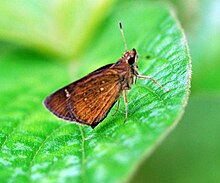
Hasora badra, the common awl, is a butterfly belonging to the family Hesperiidae, which is found in India.

Aeromachus dubius, the dingy scrub-hopper, is a butterfly belonging to the family Hesperiidae. It ranges from India to China, including Malaya, Assam, Myanmar, Laos, Vietnam, Hainan and Yunnan.

Aeromachus pygmaeus, the pygmy scrub-hopper is a butterfly belonging to the family Hesperiidae. The species range is Nilgiris, Wynaad, Coorg, Kanara, Assam to Burma and Thailand.

Arnetta mercara, the Coorg forest hopper or Coorg forest bob, is a species of butterfly belonging to the family Hesperiidae. It is found in Kerala and Karnataka.

Halpe porus, or Moore's ace, is a butterfly belonging to the family Hesperiidae, found in India.

Iambrix salsala, the chestnut bob, is a butterfly belonging to the family Hesperiidae, that is found in parts of South Asia and Southeast Asia.
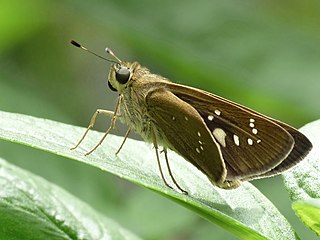
Pelopidas subochracea, the large branded swift, is a butterfly belonging to the family Hesperiidae found in India.
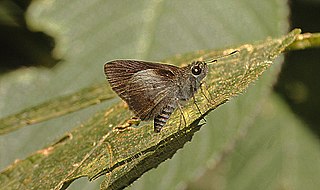
Suastus minuta, the small palm bob, is a butterfly belonging to the family Hesperiidae. It is found in the Indomalayan realm - south India, Sikkim to Burma, Sri Lanka, Thailand, Laos, Hainan, Vietnam and Malaya.

Taractrocera ceramas, commonly known as the Tamil grass dart, is a butterfly belonging to the family Hesperiidae. It is found from the Western Ghats to Mumbai, in the hills of southern India, in northeast India to northern Burma and in south-eastern China.

Thoressa astigmata, the southern spotted ace, is a butterfly belonging to the family Hesperiidae. The species was first described by Charles Swinhoe in 1890. It is endemic to the Western Ghats of India and is found in the states of Kerala, Tamil Nadu and Karnataka.
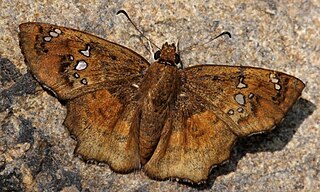
Abaratha agama, the spotted angle, is a species of butterfly belonging to the family Hesperiidae. It is found from southern India to Myanmar and in Thailand, Laos, Vietnam, southern China, Java and Sulawesi. The species was first described by Frederic Moore in 1857.
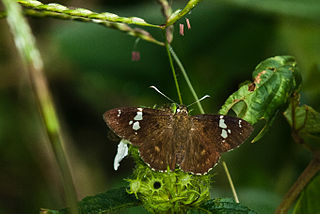
Celaenorrhinus ruficornis, the Tamil spotted flat, is a butterfly belonging to the family Hesperiidae which is found in India, Java, and the Sulawesi Region.
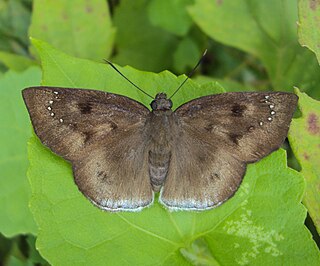
Tagiades gana, the immaculate snow flat, large snow flat or suffused snow flat, is a butterfly belonging to the family Hesperiidae found in Indomalayan realm.
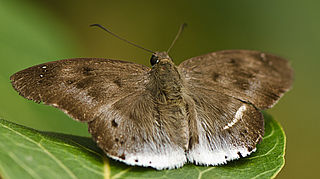
Tagiades japetus, commonly known as the pied flat or the common snow flat, is a species of spread-winged skipper butterfly belonging to the family Hesperiidae. It is widely distributed, being found from India, the Himalayas, Southeast Asia, to Australia. It contains several recognized subspecies.

Hyarotis adrastus, the tree flitter, is a butterfly belonging to the family Hesperiidae found in South Asia and Southeast Asia.

Belenois aurota, the pioneer or pioneer white or caper white, is a small to medium-sized butterfly of the family Pieridae, that is, the yellows and whites, which is found in South Asia and Africa. In Africa, it is also known as the brown-veined white, and is well known during summer and autumn when large numbers migrate north-east over the interior.

Appias libythea, the striped albatross, is a small butterfly of the family Pieridae, that is, the yellows and whites, which is found in south and southeast Asia.
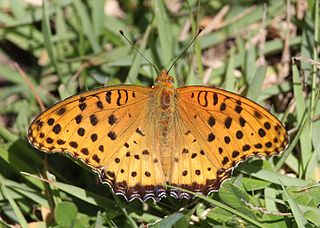
The Indian fritillary is a species of butterfly of the nymphalid or brush-footed family. It is usually found from south and southeast Asia to Australia.
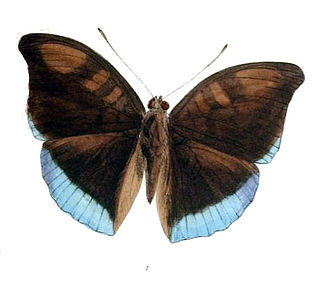
Euthalia telchinia, the blue baron, is a species of nymphalid butterfly found in South and Southeast Asia. It was first described by Édouard Ménétries in 1857.
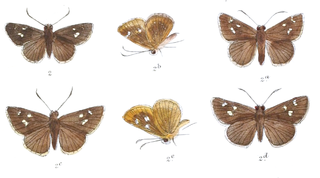
Arnetta atkinsoni is a species of skipper butterfly found in South Asia.

